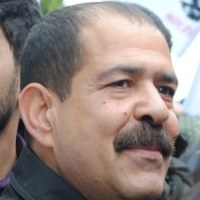![]()
Wed, Dec 14, 2011 | Rubin Reports | By Barry Rubin
My Critique of Two “Neo-Conservative” Presidents: Obama and Bush
Chorus onstage sings, “Springtime for Hitler….”
Woman in audience: “This is shocking!”
Man in audience: “Outrageous!”
Bialystock at back of theatre smiling: “Ahhhhh, it’s going better than I expected!”
— ”The Producers”
A reader has accused me, in pretty nasty terms, of having been a big advocate for the Iraq war and thus presumably some satanic force in misleading the United States (Footnote). That is not true. In fact I was not a supporter at all, as friends know from hearing me argue against it. There are two possibilities here: either the person is deliberately lying or is confusing me with Michael Rubin, no relation. If the latter is so, the reader is welcome to apologize and withdraw his remarks.
Meanwhile, a hitherto unknown Huffington Post writer with no known expertise on the Middle East, has accused me of being not only an alarmist about revolutionary Islamism but also as a “neo-con,” which has become shorthand for “Jew.” These people are so intellectually bankrupt that they don’t even realize that they are arguing the precise opposite of their own claims. After all, if I were a “neo-con” I would have been very enthusiastic about the revolution, right?
As I have repeatedly pointed out — and shown in more than 20 books — my approach is to international affairs is that of a foreign policy Realist who focuses on national (or regime) interests as motivating Middle East governments and as the force that should be shaping U.S. policy. In 1979, I pointed out how President Jimmy Carter’s democracy agenda helped bring down the shah’s regime in Iran and also misread the incoming regime as “moderate,” being among the first to warn where Ayatollah Ruhollah Khomeini was going and what the consequences would be.
Here’s a short passage from my book, Paved with Good Intentions, that’s relevant today:
“It was the nature of modernization itself…that caused as much or possibly even more opposition to the shah than did human rights violations. Iranians therefore turned toward the alternative, negative view of modernization offered by Khomeini’s camp. American policymakers and journalists, with a naive belief in the force of economic development in politics, had great difficulty in understanding the roots of this response, even after the revolution.” (p. 195)
In other words, Western observers thought the Iranian revolution would be mainly a protest against repression and poverty. Thus, the new government would be democratic and put development first. But the opposition was based on the shah’s challenge to traditional society, and thus would take the direction of Islamism at home, radicalism at home, and lots of repression.
After the revolution, as I pointed out, Carter’s efforts to show how happy he was with the outcome and eager to build good relations, the revolutionaries hated Carter and America. Yet the revolutionaries made America their number-one enemy. This was no mere misunderstanding: they needed to do so to manipulate (although the masses were already inclined in that direction!) the population to support the radical regime and policies.
The man who was America’s leading Iran expert at the time — I won’t say his name because he basically was a good guy who did some fine work otherwise — said that some in Iran wanted: “A puritanical Islamic society but the thrust of the religious opposition is centrist and reformist.”
My evaluation of Iran didn’t turn out to be alarmist, but it certainly made me cynical — though sorrowfully so — about those who think they are going to bring quick democracy to the Middle East.
Since then I have accurately predicted: Hizballah’s takeover of Lebanon, Hamas’ victory in the Palestinian elections, the Turkish regime’s increasingly radical course, the Muslim Brotherhood’s rise to be the leading force in Tunisia and Egypt (and, indeed, the 2011 Egyptian revolution itself three months before it happened), the Palestinian Authority’s rejectionism and total failure of the “peace process” to make any progress since 2000, and some other stuff.
So in this era of the greatest “neo-conservative” of all, President Barack Obama — who doesn’t care what replaces existing governments as long as there’s a vote on it — I thought it might be interesting to review my writings on the subject.
Here’s an article I wrote at the time showing how I — and Israel generally — were not advocates of the war. You might also read my article from 2005 in which I was just about the first person to urge a U.S. withdrawal from Iraq: Barry Rubin, “Reality Bites: The Impending Logic of Withdrawal from Iraq,” The Washington Quarterly, Spring 2005, Vol. 28, No. 2, pp. 67-80. Here’s a similar article from 2004. I also found an example of my critique of what has been called the “neo-conservative” argument from 2003 and I think it stands up well, with the change since then that radical Islamists have learned (the Turkish model) to pretend they are moderate and pro-democratic. Remember two points.
I also wrote a book expressing both my sympathy for the moderate reformers and my skepticism about their ability to succeed, The Long War for Freedom: The Arab Struggle for Democracy in the Middle East, John Wiley Publishers (2005). Here is an extract from that book:
“Not only did Bush insist that democracy in the Arab world was possible, he asserted that it was inevitable. People in the Muslim world also wanted freedom to improve their lives. As in many other countries, the dissidents and political prisoners of today would become the national leaders of tomorrow. By this means, as elsewhere, states that had once been enemies would become “loyal friends of the United States.”
“But Bush also had to strain himself to find ‘hopeful signs of change.’ He claimed that many Muslims already lived under democracy by including non-Arab societies like India, Turkey, and Indonesia, and boasted about the holding of some not so free or fair elections in Bahrain, Morocco, and Jordan. By using simplistic analogies to such former dictatorships-turned-democracy as Germany and Japan, he ignored differences with the Arab situation such as the power of nationalism or religion being mobilized against democracy there, the weakness of internal democratic forces, and the way that liberal ideas were discredited as tools of imperialist infidels.
“Another major problem for a pro-democratic U.S. policy was how to deal with the regimes themselves. ‘America is working with governments and reformers throughout the Middle East,’ Bush claimed. Yet this was a contradiction. He flattered Egypt as the Arab world’s leading country that might be in the vanguard for reform and suggested the Saudi monarchy was moving toward greater openness. But the fact that the United States had to cooperate with regional governments on many other issues made it hard for Washington to press them on democracy and human rights. For example, the United States needed a good relationship with Pakistan for its effort in Afghanistan despite the fact that this government was a dictatorship, sponsor of terrorism, and helped radical Arab states obtain weapons of mass destruction.
“The regimes would hardly help Bush subvert themselves. How could Bush simultaneously ensure the regimes were not frightened or angered into wielding terrorism and anti-Americanism at the prospect of such U.S. pro-democratic subversion and appeal over the ruler’s heads to masses who had far more in common with them than him? What would the United States actually do if the regimes ignored its demands? These contradictions could not easily be bridged. In Iraq, the regimes would take their revenge and seek to sabotage his campaign, some by sponsoring anti-American violence, others by cheering it on.
“In general, too, Middle Eastern public opinion polls did not agree with Bush’s assessment. True, surveys showed a high regard for democracy as a system but on the specifics of all outstanding issues they continued to show a strong support for the local status quo in practice. And even producing a resolution of the Arab-Israeli conflict — supposedly the magical solution to all such contradictions — would not alter at all the political realities of the Arab world. In fact, the regimes and radicals had worked hard to block peace precisely because it might undermine their power. This kind of situation had doomed his predecessor’s peace process and defeated his own attempts to encourage a more moderate Palestinian leadership.
“Finally, there was the vital problem of an Islam dominated politically in this era by militant voices and interpretations. ‘When terrorists and tyrants resist and attack freedom,’ Bush said, ‘they are resisting and attacking the hopes of Muslims everywhere. When terrorists go on missions of suicide and murder, they defile the high ethical teachings of Islam, itself.’ But even if these steps truly deviated from Islam as generally practiced over the centuries, what if many or most Muslims did not think so? And how could this situation be altered? Despite the respect he paid to Islam’s moderate and humanitarian aspects, Bush was backing one interpretation against another in a battle within that religion. His opinion or that of the West in general would have little effect in that struggle nor would the side it preferred necessarily win.
“The dictators’ and extremist ideologies’ effort to sabotage democracy, inherent difficulty of building such a system, radical interpretation of Islam’s political role, and local people’s doubts about reform’s benefits would soon be blowing up Americans in post-Saddam Iraq. Whatever the United States said or did, most of the region’s regimes, Islamists, and intelligentsia would tell their people that it was an enemy brutalizing Arabs, hostile to Islam, eager to steal oil and turn them into slaves of its empire.”
And that was before democratic elections brought us Hamas in the Gaza Strip, Hizballah in Lebanon, and the repeated victories of the Islamist regime in Turkey. The bottom line was, and is, that those in power will effectively block moderate reform, or there will be an upheaval and Islamists will come to power. This is what I warned about eight years ago — and more — and this is what’s happening now. Bringing democratic reform to the Middle East as a way of achieving moderate, democratic societies with higher living standards and happy, peaceful people is a wonderfully noble idea. Unfortunately, it won’t work at this point in history and will only make things worse. Those who advocate such things generally have no real comprehension of these societies.
Winston Churchill famously said that democracy was a terrible system but better than all the others. The problem in the Middle East is that democracy — or, more accurately, merely holding elections to choose a new dictatorship — is the gateway to all the others.
Footnote: In this case, satanic force misleading the United States means “Jew.”



 RSS
RSS











My Critique of Two “Neo-Conservative” Presidents: Obama and Bush | Middle East, Israel, Arab World,. http://t.co/EFbGN26J
My Critique of Two “Neo-Conservative” Presidents: Obama and Bush | Middle East, Israel, Arab World,. http://t.co/EFbGN26J